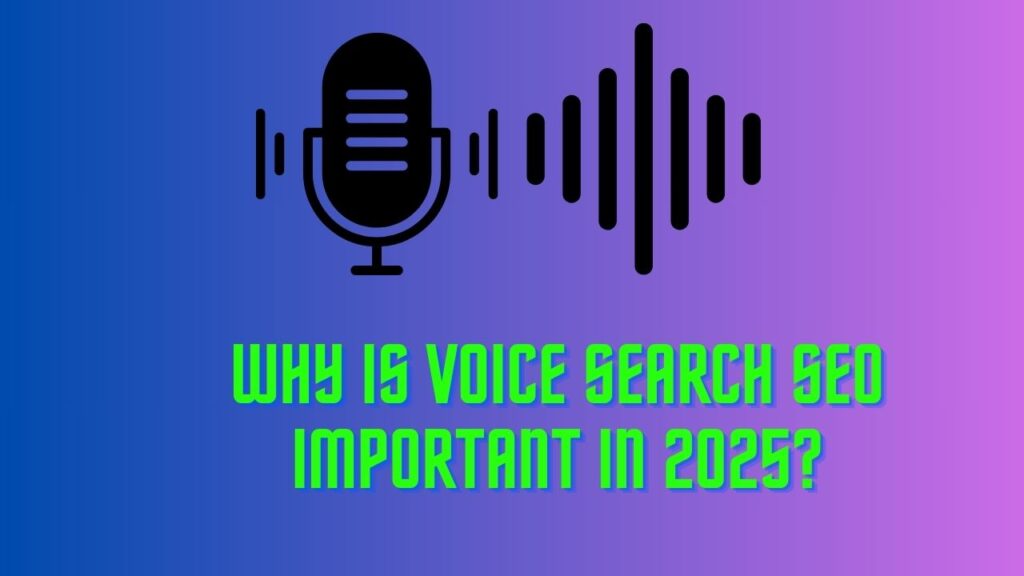Table of Contents
ToggleWhat is Voice Search SEO The Ultimate Guide 2025

What is Voice Search SEO The Ultimate Guide 2025. Voice search SEO is revolutionizing the way people interact with search engines. With the increasing popularity of voice assistants like Google Assistant, Alexa, and Siri, optimizing your website for voice search has become crucial in 2025.
This guide will help you understand voice search SEO, its importance, and how you can optimize your content effectively. Today in this blog we will learn in detail about Voice Search SEO and how you can optimize your website for voice search, so stay with us till the end.
What is Voice Search SEO?
Voice Search SEO refers to optimizing your website and content to appear in voice search results. Unlike traditional text-based search, voice search queries are more conversational and longer. It requires a different approach to keyword research, content structuring, and technical SEO.
Voice Search SEO is a revolutionary shift in how we interact with search engines. Unlike traditional text-based searches, where users type short, keyword-heavy queries, voice search is more natural, conversational, and question-driven.
With the rise of voice assistants like Google Assistant, Siri, Alexa, and Cortana, people are now speaking to their devices instead of typing, expecting instant and precise answers. This means businesses and content creators must rethink their SEO strategies to keep up with the changing digital landscape.
Imagine this—you’re cooking in your kitchen, and suddenly, you need a quick recipe. Instead of wiping your hands and typing into Google, you simply say, “Hey Google, what’s the best recipe for chocolate cake?” Within seconds, you get an answer, read aloud to you.
This is the power of voice search! It’s fast, hands-free, and incredibly convenient. But behind this seamless experience lies the need for websites to be optimized for voice search queries.
Moreover, local SEO plays a crucial role in voice search. Many voice searches include phrases like “near me” because people use their voice assistants to find local businesses, restaurants, and services while on the go.
If your business isn’t optimized for local searches—by having an updated Google My Business profile, customer reviews, and localized keywords—you might be missing out on a huge chunk of potential customers.
The future of SEO is shifting rapidly, and voice search is not just a trend—it’s a necessity. As AI-driven search continues to evolve, businesses that adapt to this change will stay ahead, while those who ignore it may struggle to remain visible online.
Why is Voice Search SEO Important in 2025?

Voice search isn’t just a trend—it’s a revolution in how people find information online. In 2025, ignoring voice search SEO means missing out on massive opportunities to connect with your audience in a faster, more natural way. Here’s why it’s more important than ever:
1. Explosive Growth of Voice Assistants
Millions of people now rely on Google Assistant, Siri, Alexa, and Cortana for instant answers. Voice search usage is skyrocketing, and if your business isn’t optimized for it, you’ll lose visibility in this growing space.
2. The Shift to Hands-Free Convenience
People are using voice search while cooking, driving, or multitasking—moments when typing isn’t practical. Your content needs to be easily accessible and optimized to provide quick, direct answers to their spoken queries.
3. More Conversational & Natural Searches
Unlike typed searches, voice queries are longer and more question-based. Users are asking things like, “What is the best way to make money online?” instead of just typing “make money online.” If your content doesn’t match this conversational style, you’re missing out!
Read Also -: The 10 Most Powerful Free SEO Tools In 2024
4. The Power of Local SEO & “Near Me” Searches
More than 50% of voice searches are local-based! When people say, “Find the best digital marketing coach near me,” search engines prioritize businesses optimized for local SEO. If your Google My Business profile isn’t updated, you could be invisible to potential customers.
5. Faster, More Direct Results Win
People want instant answers—not to scroll through multiple pages. Websites that load fast, provide clear responses, and are optimized for mobile will dominate voice search rankings.
6. AI & Voice Search Are the Future
With AI-driven search getting smarter, Google and other search engines are prioritizing voice-friendly content. The businesses that adapt now will be the leaders of tomorrow, while those that ignore voice search will struggle to stay relevant.
Read Also -: Main 7 Types Of SEO In Digital Marketing
How to Optimize for Voice Search SEO

If you want to rank on Google today, then you have to optimize your website for voice search because today’s customer is so lazy that he doesn’t even like to type, he wants to search everything through voice search and wants to buy with just one click.
Further in this blog, we have told you in detail how you can make your website voice search friendly. So stay with us till the end
1. Use Conversational and Long-Tail Keywords
Imagine you’re sitting with a friend, casually asking for advice—“Hey, what’s the best way to learn digital marketing?” That’s exactly how people use voice search! Unlike traditional SEO, where short, robotic keywords like “digital marketing course” might work, voice search thrives on natural, conversational, and long-tail keywords that match how real people speak.
Using long-tail keywords not only helps in voice search optimization but also improves your overall ranking because they target highly intent-driven searches. Instead of competing for broad, highly competitive keywords, you can focus on precise phrases that match user intent. For example, instead of optimizing for “SEO tips”, try “What are the best SEO strategies for small businesses in 2025?”
The key is to write like you talk—your content should sound natural, engaging, and helpful. Google’s AI is getting smarter, prioritizing conversational and context-rich content over keyword stuffing. So, if you want to win in voice search SEO, start thinking like your audience—what would they ask, and how can you answer it in the most human way possible?
2. Optimize for Featured Snippets
Imagine this: someone asks Google Assistant a question, and instead of scrolling through multiple search results, they instantly hear your website’s answer read aloud. That’s the power of featured snippets! These are the short, direct answers that appear at the very top of Google’s search results—also called Position Zero. And guess what? Voice assistants love reading from featured snippets!
If you want your content to be the first answer people hear, optimizing for featured snippets is a game-changer. But how do you do it? Keep it simple, clear, and structured. Voice search prioritizes content that provides quick, to-the-point answers—not long, complicated paragraphs.
Here’s what works best:
✔ Use question-based headings (like “What is Voice Search SEO?”).
✔ Answer questions concisely in 40-60 words right at the beginning.
✔ Use bullet points or numbered lists—Google loves structured content!
✔ Break down complex topics into easy-to-read sections.
Think of it this way—when someone says, “Hey Siri, how can I improve my website’s ranking?”, you want your website to be the answer Siri reads. That’s why optimizing for featured snippets isn’t just about SEO—it’s about being the go-to expert when people ask for help. So, the question is: Will your content be the one that gets heard first?
3. Improve Website Loading Speed
Have you ever clicked on a website, waited for it to load… and then gave up in frustration? You’re not alone! In today’s fast-paced digital world, speed is everything. If your website takes more than 3 seconds to load, you’re already losing visitors—and even worse, voice search won’t even consider your site!
Think about it—when someone asks Google Assistant or Alexa a question, they want instant answers. Voice search prioritizes websites that load fast, because slow sites create a bad user experience. And if Google doesn’t like slow websites, neither will your audience!
So, how do you make your website lightning-fast?
✔ Optimize images – Large, uncompressed images slow down your site. Use formats like WebP instead of JPEG/PNG.
✔ Use a fast hosting provider – A cheap, slow hosting plan can ruin your website speed. Invest in high-performance hosting.
✔ Enable caching – This helps browsers store a version of your site so it loads faster next time.
✔ Minimize code – Reduce unnecessary JavaScript, CSS, and other elements that slow things down.
✔ Use a Content Delivery Network (CDN) – A CDN helps your site load faster no matter where users are located.
4. Leverage Local SEO
Imagine this: Someone is out in your city, searching for the best digital marketing coach near me or the top café open right now—and their voice assistant gives them an answer. Will it be your business? Or will you be invisible while your competitors get all the traffic?
Local SEO is a game-changer, especially for voice search. More than 50% of voice searches are location-based, meaning people are actively looking for services near them. If your business isn’t optimized for local SEO, you’re missing out on customers who are ready to buy.
How to Dominate Local SEO:
✔ Claim & optimize your Google My Business (GMB) profile – Make sure your business details are accurate, complete, and include relevant keywords.
✔ Encourage customer reviews – Positive reviews boost trust and improve your local rankings.
✔ Use location-based keywords – Instead of just “digital marketing course,” try “best digital marketing course in Mumbai” or “top digital marketing consultant near me.”
✔ Ensure mobile-friendliness – Most voice searches happen on mobile. If your site isn’t mobile-optimized, you’re losing local traffic!
✔ List your business in local directories – Websites like Yelp, Justdial, and local business listings help search engines verify your credibility.
5. Create FAQ Sections
Ever asked Google Assistant, Alexa, or Siri a question and instantly got the perfect answer? That’s because smart businesses are leveraging FAQ sections to win in voice search SEO! If you’re not doing this yet, you’re leaving massive opportunities on the table.
Voice search is all about quick, direct answers—and an FAQ section is the perfect way to provide them. People don’t type the way they talk. Instead of searching “SEO tips,” they ask, “How can I improve my website’s SEO?” Your FAQs should mirror these real-life questions to match what users are asking.
🔥 Why FAQs are a Must-Have for Voice Search SEO?
✔ Instant Answers – Voice assistants love FAQ sections because they provide clear, structured responses in seconds!
✔ Boosts Featured Snippet Chances – Google often pulls FAQ answers for Position Zero, giving your website top visibility.
✔ Improves User Experience – When visitors get quick answers, they stay longer, reducing bounce rates and improving engagement.
✔ Targets Long-Tail Keywords – FAQs naturally include conversational, question-based search terms that match how people speak.
🚀 How to Optimize Your FAQ Section for Voice Search?
✅ Use real, question-based headings – Example: “How can I rank higher on Google in 2025?”
✅ Keep answers short, clear, and to the point – Ideally 40-60 words for voice search readability.
✅ Structure answers in bullet points when possible – Google prefers well-organized content!
✅ Add schema markup – This helps search engines understand and highlight your FAQs better.
6. Optimize for Mobile Devices
A potential customer asks their phone, “Where can I find the best digital marketing course near me?” or “How do I start a blog and make money?” Within seconds, their voice assistant pulls up results. Will your website be one of them?
Here’s the truth—voice search happens mostly on mobile devices. If your website isn’t fast, responsive, and mobile-friendly, you’re not just losing rankings—you’re losing real customers who are actively searching for your services!
🔥 Why Mobile Optimization is Crucial for Voice Search?
✔ More than 60% of all searches happen on mobile – If your site doesn’t load well, people will leave.
✔ Google uses mobile-first indexing – If your mobile site isn’t optimized, your rankings will suffer.
✔ Voice searches are often local and urgent – People use voice search on the go, looking for quick solutions. If your website is slow or difficult to navigate, they’ll move on—fast!
🚀 How to Make Your Website Mobile-Friendly?
✅ Use a responsive design – Your website should look and function perfectly on all screen sizes.
✅ Improve loading speed – Compress images, use fast hosting, and enable caching to reduce load times.
✅ Simplify navigation – Make sure menus, buttons, and CTAs are easy to click on a small screen.
✅ Use readable fonts – Tiny text frustrates mobile users. Stick to clear, legible fonts.
✅ Optimize for local searches – Since most voice searches are local, include location-based keywords and update your Google My Business profile.
FAQs About Voice Search SEO
1. What are voice search queries?
Voice search queries are spoken searches made using digital assistants like Google Assistant, Alexa, or Siri. These queries are often longer and more conversational than typed searches.
2. How does voice search impact SEO?
Voice search changes the way users interact with search engines, prioritizing natural language, quick answers, and mobile optimization. Websites must focus on long-tail keywords, structured data, and local SEO.
3. What industries benefit most from voice search SEO?
Industries like local businesses, e-commerce, healthcare, and digital marketing benefit significantly from voice search optimization as users often seek immediate and location-based results.
4. How can I check if my website is optimized for voice search?
Use tools like Google Search Console, Page Speed Insights, and structured data testing tools. Also, try voice-searching your target keywords and see if your site appears in results.
5. What is the future of voice search SEO?
Voice search is expected to become more advanced with AI and machine learning. Businesses should focus on real-time answers, AI-driven content, and user intent-based optimization.
Conclusion
Now we have come to the summary of this blog. Voice search SEO is a game-changer in 2025. By optimizing for conversational queries, featured snippets, and local SEO, businesses can stay ahead of the competition. Implement these strategies to make your website voice-search-friendly and enhance user experience.
Are you ready to optimize your site for voice search SEO? Start implementing these strategies today! If you also want to make your website voice friendly and want to grow your business by learning digital marketing, then hello my name is Rozy Sawant, I teach digital marketing on live zoom.
If you also want to learn digital marketing and want to make your website voice search friendly, then Register for my online classes, I will meet you soon in my online classes, till then keep learning and keep growing.
